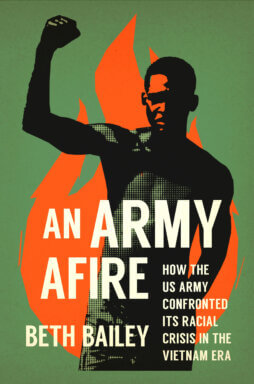Thank you for your service

“An Army Afire: How the US Army Confronted Its Racial Crisis in the Vietnam Era” by Beth Bailey
c.2023,
The University of North Carolina Press
$35.00
341 pages
Spine straight, shoulders back, arms at sides, feet pointing front.
Atten-SHUN! There you stood with your fellow soldiers, all in formation, upright and alert, waiting for words of release from your position. Chevrons on a uniform indicates who has rank and can set you “at ease.” Ribbons are significant, pins can tell tales but, as in the new book “An Army Afire” by Beth Bailey, skin color should have no bearing here.
From the beginning, “Black men… fought in America’s armies” though, for decades, they did so mostly in segregated units. Occasionally, the idea of equality surfaced before Harry Truman moved to desegregate America’s military but nothing lasted and separation of races in the ranks continued until serious efforts were put forth. Even then, some experts continued to predict “massive resistance to racial integration.”
By the mid-1960s, when Black Americans were fighting for civil rights and Black soldiers were being drafted into the Army to fight in Vietnam, the issues of equality seemed to expand on two continents. Maj. Lavell Merritt made news in 1968 when he took the Army to task, forcing President Johnson to see “that we do have race problems.” In the months to come, “Racially charged violence exploded throughout the army…”
An Army Afire author, Beth Bailey.Photo by Sue Hudelson
“By… the 1970s,” Bailey says, “race was tearing the army apart.”
This didn’t go unnoticed by politicians; in fact, Secretary of Defense Robert McNamara “did mean to use the full power of the Department of Defense to bring about change.” There was progress, but there was a story behind every bit of forward movement: the army wasn’t the only place where issues of racism lurked. Racism continued in the whole country and until the problem was addressed off-post as well as on, here and abroad, inequality would be around despite everything the Army tried to do.
Even today, with a volunteer army in America, Bailey says “Fundamental questions remain. New questions have emerged. But the affirmative actions to which the US Army committed itself in the 1970s continue to provide the institutional framework for solutions.”
Here’s a sentence you should not take lightly: “An Army Afire” is probably not going to be anybody’s idea of a beach read. It’s interesting, but it will demand a fully-engaged brain or you’ll be lost within a few pages.
Part of that may come from the non-linear way that this tale is told. Author Beth Bailey shares a wide story that necessitates some looseness in timeline, which can both clarify and confuse, depending on a reader’s previous knowledge of the subject. That’s not to say that you need to be a PhD to read this book, but a walking knowledge of the Vietnam War and/or politics from the Johnson and Nixon administrations will help.
Having said that, though, surprisingly, a casual browsing through this book may yield a reward, too, in the small stories that stack up to make a bigger picture for veterans or for fighters for equality. “An Army Afire” is history, and heavy-duty at that, but it still might capture your attention.




